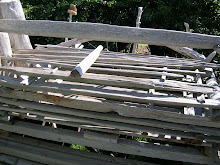 When I walk, I meditate, though I frequently play. I collect similar objects. I collect cellophane cigarette box wrappers. Repeatedly adding one to another, I create clear pockets for odd bits. Some of them directly relate to play: a marble. Others relate to the idea of play: a small stick. In an earlier time I collect colorful elastic hair ties. They make rings around a bottle on top of the medicine cabinet. Some number of hair ties affirm each walk cycle. The final collection affirms a season of early morning reverie.
When I walk, I meditate, though I frequently play. I collect similar objects. I collect cellophane cigarette box wrappers. Repeatedly adding one to another, I create clear pockets for odd bits. Some of them directly relate to play: a marble. Others relate to the idea of play: a small stick. In an earlier time I collect colorful elastic hair ties. They make rings around a bottle on top of the medicine cabinet. Some number of hair ties affirm each walk cycle. The final collection affirms a season of early morning reverie.Along the path stand a series of trees that I alter in some way with rocks that I place near their trunks. I smile when I inadvertently come across another walker's walking annotation. One time I come by and find my stones moved out of place.
Someone played a different game. I reset them. I return to my steps; I sigh; I smile. Some years later a storm reworks the area. Nature plays a different game. I return to my steps; I sigh; I smile.
Repetition Exercise #5: More Walking
Go walking. Attend to movement and breath, to sensations and thought patterns, and to other factors that surface. Maybe collect more than repetitions of movement. For a set period of time walk the same route. Know repetition, hold continuity, experience subtle change.
One time when I walked, I heard a drum beat and altered my steps to respond to this beat. How can people suppress the response to the beat? This inner urge to move with the rhythms that surround us seems to express itself as the first few notes register.
Rhythm works on the basis of repetition. Clapping and drumming seem like great games of repetition. Our bodies remember these rhythms, which get passed from friend to friend and from generation to generation. Childhood clapping games, based on repetition and speed, show up in diverse cultures. While hiking up a series of switchbacks along a section of the John Muir Trail, I decided to involve a friend in a repetition game where at each switchback of over twenty, we added a movement to the previous ones beginning with a simple clapping against raised hands. Word traveled out about those guys on the switchbacks.
We can consciously celebrate through meditative repetitions many early behaviors. I imagine for some that the act of standing up or of initiating movement through crawling brings playful pleasure through attention to the repetition. We can rediscover experience through playfulness. Perhaps that happens when we crawl on the ground with an infant who will crawl without modeling. Most children will not just sit here.
 Exercise routines require this kind of play. Take courage and exercise playfully. Activities that we like to repeat enter our routine. If we add an object to the routine as a counter, then that object affirms our behavior. It may be as simple as a stone from the path or as altruistic as collecting a bit of trash and disposing of it properly.
Exercise routines require this kind of play. Take courage and exercise playfully. Activities that we like to repeat enter our routine. If we add an object to the routine as a counter, then that object affirms our behavior. It may be as simple as a stone from the path or as altruistic as collecting a bit of trash and disposing of it properly.

No comments:
Post a Comment